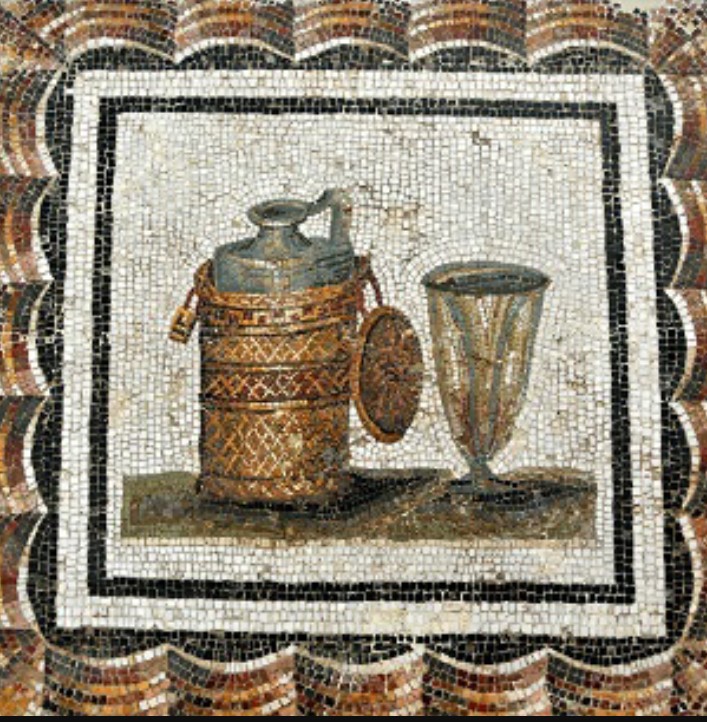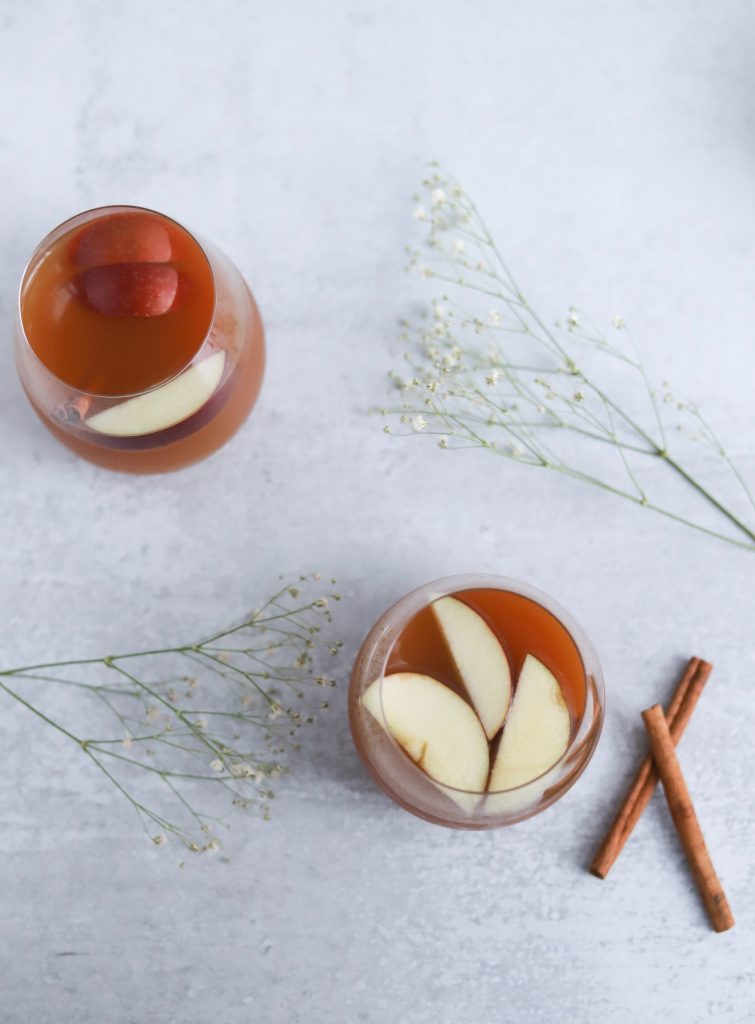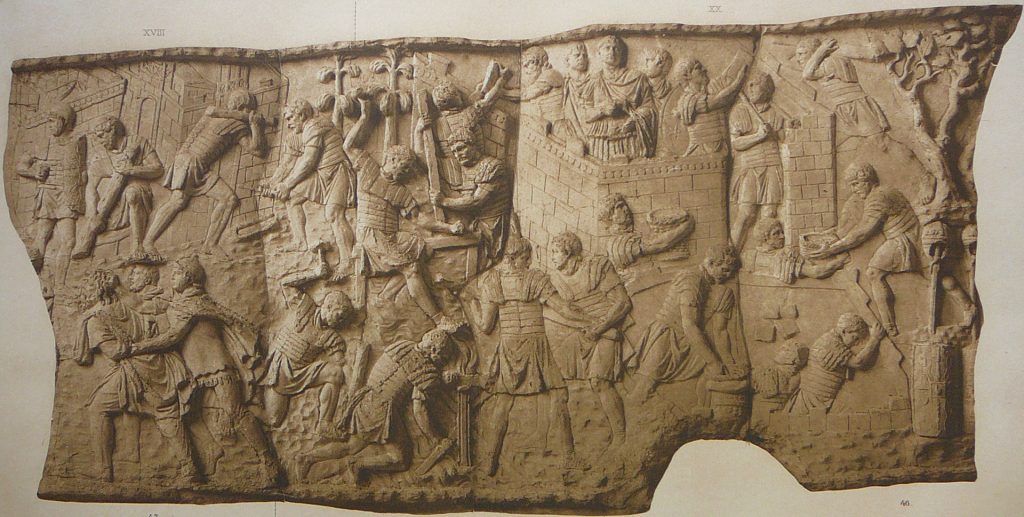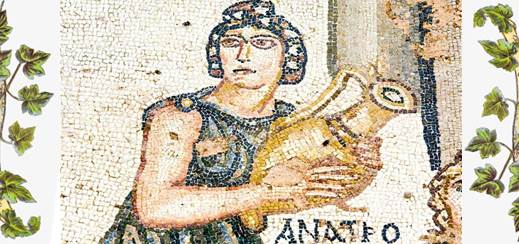I romani usavano questa bevanda energizzante e disinfettante per dissetarsi.
(English follows)
“POSCA FORTEM….VINUM EBRIUM FACIT”
-la POSCA fortifica mentre il vino inebria-
Sappiamo quanto sia importante bere tanta acqua per mantenersi idratati. Lo sapevano soprattutto i legionari romani che facevano massacranti marce di oltre 30 chilometri al giorno carichi di 20 chili e più di bagagli. Una cosa è certa, un esercito non può vincere se ha sete.
La bevanda che li sosteneva era chiamata dal latino posca, affine a potare “bere”. Questa miscela di aceto e acqua – e probabilmente anche sale, erbe e altri ingredienti – occupa un posto speciale nella storia delle bevande grazie al suo ruolo essenziale nell’esercito romano.

Storia
Già nella metà dell’era della Repubblica Romana (509-27 a.C.), i militari razionavano la posca alle truppe insieme a cereali e, molto occasionalmente, carne e formaggio. Questo sistema è continuato per secoli, fino all’Impero Romano.
I soldati romani, ovviamente, bevevano acqua, ma documenti storici suggeriscono che non era la loro bevanda preferita. Infatti ecco cosa scrisse Plutarco di Catone il Vecchio, un ufficiale durante la Seconda Guerra Punica (218-202 a.C.), riguardo alla sua sete:
“L’acqua era ciò che beveva nelle sue campagne, tranne per il fatto che di tanto in tanto, in una sete furiosa, voleva l’aceto, o quando la sua forza veniva meno, aggiungeva un po’ di vino.”
Come Catone, i romani apprezzavano il vino per i suoi presunti benefici per la salute.
Ciò rese la posca, che conteneva l’aceto fatto con il vino andato a male, di gran lunga preferibile alla semplice vecchia H20. Inoltre il vino all’epoca era abbondante. I ricchi romani ne producevano volumi titanici. Man mano che la portata dell’imperialismo romano si diffondeva in tutta Europa, è aumentata la viticoltura, che dava agli eserciti un accesso immediato ai depositi di vino quasi ovunque.
Per i funzionari militari, il vino era una fonte economica di calorie da distribuire alla rinfusa. Diluendolo con acqua per fare la posca si raddoppiava il volume di razione liquida da dare ai soldati a un costo molto basso.
Anche nella Bibbia c’è un passo in cui è protagonista proprio la posca: quando Gesù sulla croce, ormai vicino alla morte, lamenta di aver sete, un legionario infila in una canna una spugna pregna di aceto e gliela offre. Nella tradizione cristiana era stato visto nei secoli come un gesto di estremo sfregio nei riguardi del Cristo Redentore. In realtà si era trattato di un gesto misericordioso, infatti il legionario aveva impregnato la spugna proprio di posca, la bevanda che ogni legionario aveva con sé nella borraccia.
Benefici
L’acido acetico presente nell’aceto eliminava gran parte dei microrganismi responsabili di disturbi gastrici, per cui il consumo della posca riduceva notevolmente la possibilità di ammalarsi di dissenteria.
I romani, ovviamente, non sapevano a cosa fosse dovuta tale proprietà, ma notarono che si ammalavano meno e per questo il consumo della posca si diffuse quasi ovunque nell’Impero.
L’acidità della bevanda e la leggera gradazione alcolica neutralizzano i batteri, rendendola più sicura del bere acqua pura. Questo era un grande vantaggio, dato che l’acqua contaminata è nota per aver devastato più eserciti delle battaglie stesse.
Aveva anche proprietà dissetanti straordinarie al punto da ridurre di oltre un terzo il fabbisogno giornaliero rispetto all’acqua per ogni soldato, questa proprietà aveva positive ripercussioni anche nel trasporto e ingombro delle scorte, dovendo trasportare meno riserve d’acqua.
La sua utilità non aveva soltanto una funzione dissetante, ma anche antisettica, sia per sanare ferite e abrasioni, sia per purificare l’acqua trovata durante il cammino. Inoltre si pensava che combattesse lo scorbuto.
Persino all’esercito americano durante la Guerra Messicana nel 1800 veniva dato l’aceto di mele per le sue false virtù antiscorbutiche.
Intendiamoci, i capi militari e altre élite in genere non si degnavano di bere la posca, che era più una bevanda della gente comune. Sia tra i soldati che tra la gente comune, la posca ha continuato a godere della sua fama anche nel Medioevo.
Dunque, che sapore aveva la posca? È un po’ difficile dirlo, ma a causa della sua ubiquità nella letteratura romana possiamo tranquillamente concludere che consisteva di acqua e aceto di vino rosso. Dal momento che non esistono ricette di posca romane non sappiamo se fosse caratterizzata da altri gusti.
Tuttavia, grazie agli scrittori medici bizantini non siamo completamente al buio. Ezio di Amida e Paolo di Egina, entrambi medici bizantini greci del sesto e settimo secolo, rispettivamente, scrivevano di ricette per una posca “appetibile e lassativa” che includeva cumino, semi di finocchio, semi di sedano, anice, timo e sale.
È una bevanda che senz’altro aiuta a recuperare acqua e sali minerali persi durante l’esercizio fisico, o semplicemente sudando molto. Infatti andare in giro per l’Europa e l’Asia Minore mentre si è sellati con armature e sacchi pesanti faceva senza dubbio sudare.

La ricetta
Per quanto riguarda i “moderni sudori”, perché comprare bevande sportive commerciali per placare la tua sete quando puoi farti la “Gatorade” degli antichi?
Preparare la posca è semplicissimo e alla portata di tutti. Ecco una ricetta per aiutarti. Assicurati di usare solo aceto fermentato – vino rosso, nero, balsamico o sidro di mele, per esempio – e non distillato. È probabible che la posca fosse dolicificata a volte con del miele.
Ingredienti per una posca “forte”:
500 ml d’acqua,
2 cucchiai di aceto di mele,
un pizzico di sale,
erbe aromatiche a piacere (cumino, semi di finocchio, semi di sedano, anice, timo),
dolcificare con miele o sciroppo d’acero.
Portare tutti gli ingredienti ad ebollizione, poi cuocere a fuoco lento per 30 minuti. Filtrare prima di bere. La bevanda può essere consumata anche fredda.
Personalmente preferisco non cuocere gli ingredienti, ma consumarli a crudo. La mia versione è una posca leggera, siccome non sono una legionaria! Inoltre mi piace macerarci della frutta per aumentarne il valore vitaminico e renderla più gustosa.
I miei gusti preferiti: mela +cannella, ananas, agrumi, mirtillo, fragola, lampone, menta.
Si può lasciare la frutta per alcune ore prima di rimuoverla e poi filtrare la posca, la quale divido in tre “livelli di forza”:
- posca leggera 1 cucchiaino di aceto di mele, 500 ml acqua
- posca media 1 cucchiaio di aceto di mele, 500 ml acqua
- posca forte 2 cucchiai di aceto di mele, 500 ml acqua
Ed ecco fatto, adesso puoi dissetarti e godere di ottima salute come un legionario. Bere la posca ormai fa parte del mio rituale quotidiano e in estate se fa tanto caldo aggiungo anche qualche cubetto di ghiaccio!

English version:
“POSCA FORTEM….VINUM EBRIUM FACIT”
-POSCA fortifies while wine intoxicates-
We know how important it is to drink lots of water to stay hydrated. The Roman legionaries who faced grueling marches of over 30 kilometers per day laden with 20 kilos and more of baggage knew it well. One thing is certain, an army cannot win if it’s thirsty.
The drink that supported them was derived from the Latin word posca, akin to prune “drink”. This mixture of vinegar and water – and possibly salt, herbs and other ingredients – occupies a special place in the history of drinks thanks to its essential role in the Roman army.
History
As early as the middle of the era of the Roman Republic (509-27 BC), the military rationed the troops with cereals and, very occasionally, meat and cheese. This system continued for centuries, until the Roman Empire.
Roman soldiers obviously drank water, but historical records suggest that it was not their favorite beverage. In fact, here is what Plutarch wrote of Cato the Elder, an official during the Second Punic War (218-202 BC), about his thirst:
“Water was what he drank in his campaigns, except for the fact that occasionally, in a raging thirst, he wanted vinegar, or when his strength waned, he added some wine.”
Like Cato, the Romans appreciated wine for its alleged health benefits.
This made posca, which contained vinegar made with wine gone bad, far preferable to good old H20. In addition, wine was abundant at the time. The rich Romans produced titanic volumes of it. As Roman imperialism spread across Europe, viticulture followed, giving armies immediate access to wine supplies almost everywhere.
For military officials wine was an inexpensive source of calories to be distributed in bulk. Diluting it with water to make posca doubled the volume of liquid to be rationed to soldiers at a very low cost.
Even in the Bible there is a passage in which posca is the protagonist: when Jesus on the cross is near death, he laments that he is thirsty, so a legionary places a sponge soaked with vinegar on a cane and offers it to him. In the Christian tradition it was seen over the centuries as a gesture of extreme scarring towards Christ the Redeemer. In reality it was a merciful gesture, in fact the legionary had soaked the sponge in posca, the drink that every legionary had inside his bottle.
Benefits
The acetic acid present in the vinegar eliminated most of the microorganisms responsible for gastric disorders, so the consumption of posca significantly reduced the possibility of getting sick with dysentery.
The Romans, of course, did not know what this property was due to, but they noticed that they became less sick and therefore the consumption of posca spread almost everywhere in the Empire.
The acidity of the drink and the slight alcohol content neutralize the bacteria, making it safer than drinking pure water. This was a big plus, as contaminated water is known to have wreaked havoc on armies more than the battles themselves.
It also had extraordinary thirst-quenching properties to the point of reducing by more than a third the daily requirement with respect to water for each soldier. This property had positive repercussions also in the transport and bulk of the stocks, having to carry fewer water reserves.
Its usefulness had not only a thirst-quenching function, but also an antiseptic one, both to heal wounds and abrasions, and to purify the water found along the journey. It was also thought to fight scurvy.
Even the American army during the Mexican War in 1800 was given apple cider vinegar for its false antiscorbutic virtues.
Mind you, military leaders and other elites in general did not deign to drink posca, which was more a drink for ordinary people. However, both among soldiers and ordinary people, posca continued to enjoy its fame even in the Middle Ages.
So what did posca taste like? It’s a little difficult to say, but because of its ubiquity in Roman literature we can safely conclude that it consisted of water and red wine vinegar. Since there are no Roman posca recipes we don’t know if it was characterized by other flavors.
However, thanks to Byzantine medical writers we are not completely in the dark. Ezio di Amida and Paolo di Egina, both Greek Byzantine doctors of the sixth and seventh centuries, respectively, wrote of recipes for a “palatable and laxative” posca that included cumin, fennel seeds, celery seeds, anise, thyme, and salt.
It’s a drink that certainly helps to recover water and minerals lost during exercise, or simply by sweating a lot. In fact, going around Europe and Asia Minor while saddled with armor and heavy bags certainly made one sweat.
Recipe
As for the “modern sweats”, why buy commercial sports drinks to quench your thirst when you can make yourself the “Gatorade” of the ancients?
Preparing posca is very simple and affordable for everyone. Here is a recipe to help you. Make sure to use only fermented vinegar, red, black wine, balsamic or apple cider vinegar, for example, and not distilled. It’s possible that posca was at times sweetened with honey.
Ingredients for a “strong” posca:
500 ml of water,
2 tablespoons of apple cider vinegar,
a pinch of salt,
aromatic herbs for taste (cumin, fennel seeds, celery seeds, anise, thyme),
sweeten with honey or maple syrup.
Bring all the ingredients to a boil, then simmer for 30 minutes. Filter before drinking. The drink can also be consumed cold.
Personally I prefer not to cook the ingredients, but to consume them raw. My version is a light posca, since I’m not a legionary! In addition, I like to macerate fruit in it to increase its vitamin value and make it tastier.
My favorite flavors: apple + cinnamon, pineapple, citrus, blueberry, strawberry, raspberry, mint.
You can leave the fruit for a few hours before removing it and filtering the posca, which I divide into three “strength levels”:
light posca 1 teaspoon of apple cider vinegar, 500 ml of water
medium posca 1 tablespoon of apple cider vinegar, 500 ml of water
strong posca 2 tablespoons of apple cider vinegar, 500 ml of water
And that’s it, now you can quench your thirst and enjoy excellent health like a legionary. Drinking posca is now part of my daily ritual and in the summer, if it’s very hot, I also add some ice cubes!







